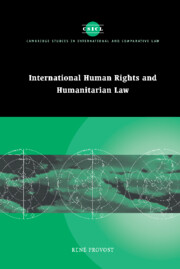Book contents
- Frontmatter
- Contents
- Acknowledgments
- Table of cases
- Table of treaties
- Table of other international instruments
- Introduction
- PART I Normative frameworks
- Introduction
- 1 Rights and procedural capacity
- 2 Obligations and responsibility
- Conclusion to Part I
- PART II Reciprocity
- PART III Application: law and facts
- General conclusion
- Bibliography
- Index
- CAMBRIDGE STUDIES IN INTERNATIONAL AND COMPARATIVE LAW
1 - Rights and procedural capacity
Published online by Cambridge University Press: 07 September 2009
- Frontmatter
- Contents
- Acknowledgments
- Table of cases
- Table of treaties
- Table of other international instruments
- Introduction
- PART I Normative frameworks
- Introduction
- 1 Rights and procedural capacity
- 2 Obligations and responsibility
- Conclusion to Part I
- PART II Reciprocity
- PART III Application: law and facts
- General conclusion
- Bibliography
- Index
- CAMBRIDGE STUDIES IN INTERNATIONAL AND COMPARATIVE LAW
Summary
There is a marked difference between human rights and humanitarian law with respect to the rights and procedural capacity of the individual. The emphasis of human rights law is on granting positive rights to the individual, while humanitarian law protects the interests of the individual through means other than the granting of rights. This difference is reflected in the recognised procedural capacity of individuals to act to enforce their rights under international human rights law and humanitarian law.
As mentioned earlier, the dissociation of rights and enforcement mechanisms can raise conceptual problems going to the very existence of the rights. International law, with its traditional emphasis on the state as the sole international subject, has had to grapple with this difficulty from the moment it recognised international rights of entities other than states. The Permanent Court of International Justice acknowledged the reality of rights even if detached from the capacity to act on them in the Peter Pázmány University v. Czechoslovakia case, where it noted with respect to that university that ‘the capacity to possess civil rights does not necessarily imply the capacity to exercise those rights oneself’. Conversely, the agent's lack of procedural capacity to enforce a given right does not necessarily establish the non-existence of that right. The explanation given to validate a finding that the agent does indeed have a right under international law even in the absence of procedural capacity is that other actors, most often states, can act on behalf of the right-holder at the international level without transforming the nature of that right.
- Type
- Chapter
- Information
- International Human Rights and Humanitarian Law , pp. 16 - 56Publisher: Cambridge University PressPrint publication year: 2002
- 1
- Cited by

